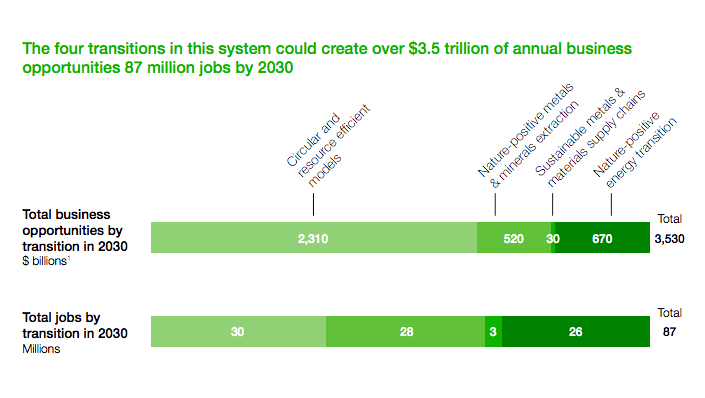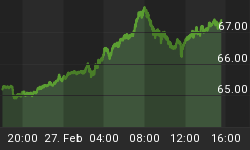Putting nature above business considerations has the potential to generate 395 million jobs and $10.1 trillion in business opportunities by 2030, the latest report by World Economic Forum (WEF) suggests.
Unprecedented job losses and economic uncertainty following the outbreak of covid-19 have governments looking into ways to stimulate growth in a safe manner. According to the WEF experts, the answer can be found in what they call a “nature first” approach.
“The global economy is inextricably linked to the health of our planet,” the report says. “How we produce, manufacture, consume and ultimately manage our waste is straining nature’s ability to cope.”
THE NEW APPROACH TO MINING AND ENERGY GENERATION COULD CREATE 87 MILLION JOBS IN 10 YEARS
The World Economic Forum
When it comes to mining and power generation, the authors said that nature-positive business —those that add value to nature — could generate an estimated $3.5 trillion worth of annual value and create 87 million jobs by 2030.
“Accounting for an estimated 23% of global GDP and 16% of employment, the extraction, production, manufacturing and generation of energy and materials is both a major contributor to global economic growth and a major threat to biodiversity,” the report reads.
The WEF adds that the sector’s negative effects – air pollution and carbon emissions – account for $9 trillion annually, or around 10.5% of global GDP.
Reversing the costly impact, the report asserts, involves improving consumption efficiency to reduce the amount of resources that need to be extracted. It also involves improving how those resources are extracted to minimize their impact on ecosystems while shifting to more renewable energy.
“Supportive regulations – such as those that encourage and support environmentally sound extractives project design, systematic rehabilitation of mining sites, and waste collection and reuse – will be significant in unlocking the value of nature-positive businesses.”
Circular economy
The study is built on real-world examples, where business outcomes have been enhanced by nature-positive outcomes. British multinational automaker Jaguar Land Rover (JLR) collected and reused around 300,000 tonnes of aluminum between 2013 and 2019.
It translated into a 30% recovery of the 180,000 tonnes of aluminum (JLR) used annually in the six-year period. The initiative has resulted in an overall drop of 46% of carbon emissions in JLR’s global vehicle production operations.
Elion, the first Chinese company to commit to 100% renewables in its operations by 2030, started as a salt chemical engineering business in the Kubuqi Desert of inner Mongolia. Frequent sandstorms damaged production and increased costs in its early years of operation. To combat desertification and sandstorms, Elion developed a comprehensive ecological restoration-based economic system.
The company has already restored nearly 650,000 hectares of desert land, thanks to the construction of sand-protecting barriers, afforestation and the closure of land for natural regeneration. This has allowed the formation of an ecological microclimate in the desert, which is attracting eco-tourists and companies focused on growing medicinal plants.

“We can address the looming bio-diversity crisis and reset the economy in a way that creates and protects millions of jobs,” Akanksha Khatri, Head of the Nature Action Agenda at the WEF, said in a statement. Related: The Tweet That Started A Trade War
The transition to a green economy is being fuelled by minerals, with demand for resources projected to double by 2060. It means that the mining sector will play a critical role in the massification of technologies such as wind turbines and solar panels.
Improving resource recovery in extraction can save up to $225 billion by 2030, the report says. “Mining and oil and gas operations often do not fully utilize all the resources in one site before moving on to new areas, increasing damage to biodiversity. New technologies and more mechanization could enhance material recovery rates by up to 50%.”
Investing in environmental, social and governance (ESG) is currently estimated at over $20 trillion in assets under management, according to Deloitte’s estimates. Companies that fail to deliver value beyond compliance could face financial consequences and a blow to their reputations.
By Mining.com
More Top Reads From Safehaven.com:
















